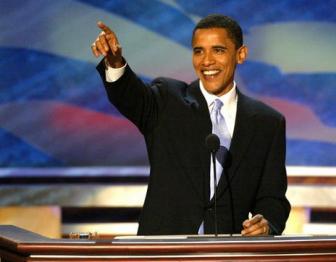Can Obama Pull Off A Historic Presidential Double Play
by Arianna Huffington

President-Elect Barack Obama
"On or about December 1910," Virginia Woolf wrote, "human character changed."
We can be much more specific: "On Nov. 4, 2008, just after 11 p.m. Eastern, America changed" (human character remains rather intransigent).
The change was driven by two things: our country's remarkable capacity for regeneration, and Barack Obama's remarkable ability to tap into the better angels of our nature.
You know something extraordinary is happening when even Michele Bachmann, Sarah Palin and Joe Lieberman trip over themselves -- and their hastily discarded invective -- to say nice things about Obama and the "tremendous signal" sent by his election.
Sure, it's easy to see their encomiums as purely tactical attempts not to be on the wrong side of history, but they are more than that. They also demonstrate how certain moments and certain individuals are able to bring out the best in people -- even people who have shown us some of the worst aspects of human character. Because, hard though it may be to accept, the best and the worst reside in each of us, side by side.
As Alexander Solzhenitsyn put it: "The line separating good and evil passes not through states, nor between classes, nor between political parties either -- but right through every human heart." And the greatest leaders are those who inspire us to reside on the good side of Solzhenitsyn's line.
Obama does more. As David Brooks wrote recently, Obama's fractured childhood "is supposed to produce a politician with gaping personal needs and hidden wounds. But over the past two years, Obama has never shown evidence of that."
Here is someone whose childhood could have easily led to a life in shambles. But Obama has somehow -- and without, as far as we know, thousands of hours of therapy --succeeded in not letting circumstances dictate his life and reactions.
During the campaign, Obama was an object lesson in equanimity. Insinuate he's Muslim or sympathizes with terrorists, and he brushes off the mud. Hammer him with trumped up charges -- "sexist," "socialist," un-American" -- and he rolls with the punches. He simply doesn't let it in. He demonstrates that we have the ability to master whether we allow setbacks and attacks to throw us off course.
A lot has been written about Obama's calm in the face of adversity over the course of the last 21 months. Less noted has been how he displays that same centeredness in the face of triumph.
On Tuesday night, he could have waxed transcendent, he could have wrung every last tear and every last cheer out of the adoring crowd at Grant Park. But he chose not to. Instead, his speech gracefully touched the clouds a few times then soberly came back to earth, focused, as always with Obama, on moving forward.
To their great credit, the American people have responded to Obama's example by remaining remarkably focused as well. Despite the seemingly endless parade of meaningless sideshows trotted out during both the primaries and the general campaign, the public refused to be distracted. These kinds of tactics had worked well in 2004 -- but not in 2008. Obama's focus, his sense of purpose cleared a path through the carnival of clownish attacks and chamber of horror scares. And voters followed.
After eight years in which it has felt like the very foundation of our country was under assault, it is a testament to our democracy's inherent capacity for regeneration -- our ability to course-correct -- that Americans responded the way they did to a campaign so premised on an appeal to our greater selves.
A country can change only to the extent that the individuals within it change (and some changes come slower than others, as evidenced by Prop 8 and the other gay marriage bans that passed on Tuesday).
So it's back to Solzhenitsyn: "If you wanted to change the world, who should you begin with: yourself or others?"
Our president-elect is obsessed with Lincoln, who changed the country both by changing government policy and by using the bully pulpit to help us change ourselves. And our president-elect is endlessly being compared to FDR, who gave us both the New Deal and one of the most famous life lessons in history: "The only thing we have to fear is fear itself."
Now it's Obama's turn to pull off this rare presidential double play.
WORLD | AFRICA | ASIA | EUROPE | LATIN AMERICA | MIDDLE EAST | UNITED STATES | ECONOMICS | EDUCATION | ENVIRONMENT | FOREIGN POLICY | POLITICS
© Tribune Media Services